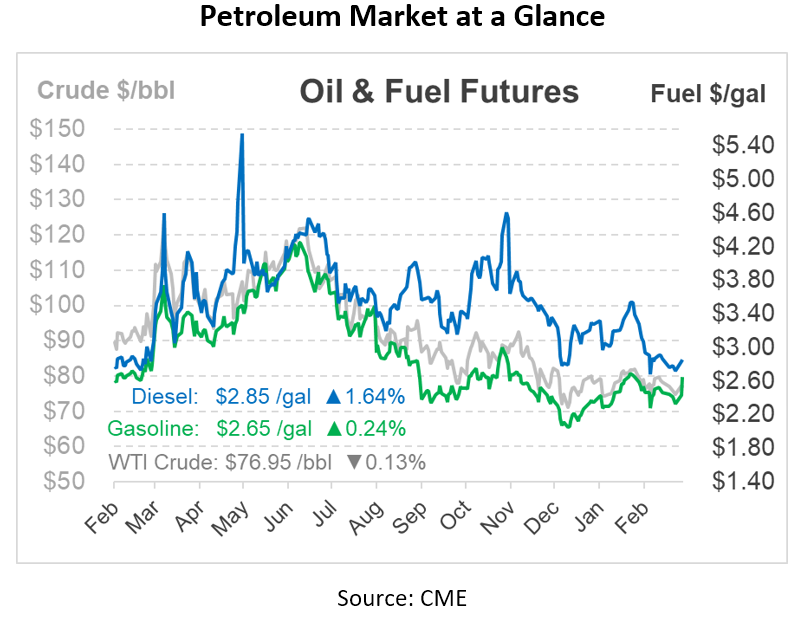
What Is It – S&P Global Platts
FUELSNews has covered fuel procurement topics such as Spot Pricing, OPIS, and more related to fuel price indexes to help you better understand where your fuel price comes from and how to protect your business against the volatile market. In our recent post on Spot Pricing, Platts was mentioned a handful of times in reference to where those prices come from. But what is Platts, and how does it mesh with fuel price indexes? Let’s find out.
What is Platts?
Platts is a global provider of energy and commodities information and benchmark price assessments. It was founded in 1909 by Warren C. Platt in the United States and is now a division of S&P Global, a financial information and analytics company.
Platts provides independent price assessments for various energy and commodities markets, including oil, natural gas, electricity, coal, petrochemicals, metals, and agriculture. Platts also provides news, analysis, and data to help market participants stay informed about market developments, regulatory changes, and industry trends. Its information and services are used by a wide range of customers, including traders, analysts, risk managers, producers, consumers, and governments. For fuel-buying customers, Platts provides a valuable source of information that can help them make informed purchasing decisions and manage price risk.
Platts benchmark prices are widely used in the fuel industry as a reference point for pricing physical and financial contracts. For example, if a fuel buyer is looking to purchase a shipment of oil, they may reference Platts benchmark price for that type of oil as a starting point for negotiations with the seller.
How Does Platts Pricing Affect Fuel?
In the downstream refined fuel industry, Platts prices are most known for reflecting prices at a regional “spot” market level. Platts also publishes forward market data, which can be used for risk management, as well as pricing and information related to biofuels.
Examples of Platts fuel pricing regions include Gulf Coast Pipeline, Gulf Coast Water, Los Angeles, Group 3, NY Harbor, and other regions. These spot prices typically cover a wide area, unlike rack pricing which is specific to a city or metro area. Example pricing might be “Gulf Coast Water Platts + $.05,” which means the fuel will be bought at 5 cents over that day’s average cost of fuel for a barge shipment from the Gulf Coast.
How does Platts pricing work?
Platts pricing methodology is based on data collection, analysis, and consultation with market participants. It’s designed to be transparent, objective, and independent, providing market participants with a reliable and trusted source of pricing information. This can help fuel buyers make more informed decisions about when to buy, how much to buy, and at what price.
Platts’ benchmark prices reflect the many factors that can influence fuel prices, such as regional supply and demand imbalances, and transportation costs – all of which result in changing market conditions, and therefore different reported rates through Platts.
In addition, Platts pricing can be affected by market volatility, changes in government policies, and other unforeseen events. For example, if there is a sudden increase in trading demand for a particular fuel, the price may rise quickly, even if there is no change in the underlying market fundamentals.
The following are the key steps in Platt’s pricing methodology.
Data Collection
Platts collects pricing data from a wide range of sources, including market participants, trade associations, industry reports, government agencies, and its own market intelligence.
Data Verification
Platts verifies the accuracy and consistency of the pricing data by conducting independent checks, comparing it with other data sources, and cross-referencing it with market fundamentals.
Market Analysis
Platts analyzes the pricing data and market fundamentals to identify trends, supply and demand factors, and market drivers that may influence the price of a commodity.
Consultation
Platts consults with market participants to gather feedback, validate pricing assumptions, and address concerns or issues.
Price Assessment
Based on the data, analysis, and consultation, Platts determines the benchmark price for a commodity that reflects the prevailing market conditions.
Publication
Platts publishes its benchmark prices daily or weekly, depending on the market, along with a detailed methodology report that explains the pricing process and assumptions.
As we continue through our What Is It Wednesday series on fuel pricing, please don’t hesitate to contact a Mansfield representative if you have further questions about purchasing fuel. Our experts can walk you through buying fuel in bulk with flexible options to match your business objectives.
This article is part of Daily Market News & Insights
Tagged:
MARKET CONDITION REPORT - DISCLAIMER
The information contained herein is derived from sources believed to be reliable; however, this information is not guaranteed as to its accuracy or completeness. Furthermore, no responsibility is assumed for use of this material and no express or implied warranties or guarantees are made. This material and any view or comment expressed herein are provided for informational purposes only and should not be construed in any way as an inducement or recommendation to buy or sell products, commodity futures or options contracts.






